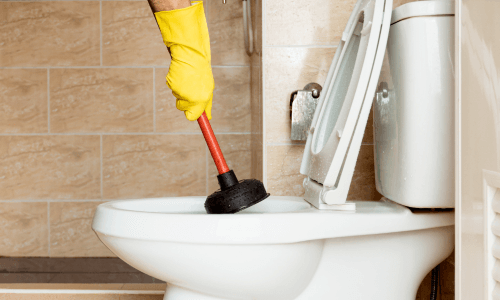
When to call a plumber for a clogged toilet
A clogged toilet is one of the most common household plumbing issues. While minor clogs can often be resolved with a plunger or a basic plumbing tool, there are times when the problem is more severe and requires the expertise of a professional plumber. Knowing when to call a plumber can save you time, stress, and potential damage to your plumbing system. In this comprehensive guide, the experts at Local Plumber in Florida will help you understand when it’s time to call a plumber for a clogged toilet and what you can do in the meantime.Understanding Clogged Toilets
Before diving into when to call a plumber, it’s essential to understand what causes clogged toilets and how they can be addressed:- Minor Clogs: Often caused by excessive toilet paper, small foreign objects, or routine buildup.
- Severe Clogs: Can result from significant blockages, pipe damage, or more complex plumbing issues.
- Signs of a Clog: Slow drainage, frequent backups, unusual noises, and overflowing can all indicate a clog.
Initial Steps for Minor Clogs
For minor clogs, you may be able to handle the situation with a few basic tools and techniques:1. Use a Plunger
A plunger is typically the first tool used to address a clogged toilet. Here’s how to use it effectively:- Choose the Right Plunger: A toilet plunger with a flange (bell-shaped end) is more effective than a standard plunger for toilets.
- Position the Plunger: Place the plunger over the drain hole, ensuring a tight seal.
- Plunge Firmly: Use a firm, consistent motion to push and pull the plunger, which can help dislodge the clog.
- Check for Results: After several plunges, check if the water starts to drain. Flush the toilet to see if the clog is cleared.
2. Use a Toilet Auger
If plunging doesn’t work, a toilet auger (plumbing snake) can help:- Insert the Auger: Gently insert the auger into the toilet bowl and push it down the drain.
- Rotate the Handle: Turn the handle of the auger to break up or capture the obstruction.
- Remove the Auger: Once you’ve cleared the clog, slowly withdraw the auger and check if the toilet drains properly.
3. Use a Natural Drain Cleaner
For minor clogs, natural drain cleaners like baking soda and vinegar can sometimes help:- Add Baking Soda: Pour a cup of baking soda into the toilet bowl.
- Add Vinegar: Follow with a cup of vinegar.
- Let it Sit: Allow the mixture to sit for 30 minutes to an hour, then flush the toilet to see if the clog is cleared.
When to Call a Plumber
If basic methods don’t resolve the issue or if you encounter any of the following situations, it’s time to call a professional plumber:1. Persistent or Recurring Clogs
- Situation: If your toilet remains clogged despite repeated attempts with a plunger or auger, or if clogs keep happening frequently.
- Why Call a Pro: Persistent or recurring clogs may indicate a deeper issue in the plumbing system, such as a blockage further down the drain line or a problem with the sewer system.
2. Multiple Fixtures Are Affected
- Situation: If the clogged toilet is accompanied by slow drainage or backups in other fixtures, such as sinks or showers.
- Why Call a Pro: This could be a sign of a broader plumbing issue, such as a main sewer line blockage, which requires professional diagnosis and repair.
3. Toilet Overflows
- Situation: If the toilet overflows, especially if it happens repeatedly or causes water damage to your bathroom.
- Why Call a Pro: Overflowing can indicate a severe blockage or issue with the toilet’s flushing mechanism. Professionals can address the problem safely and prevent further damage.
4. Unusual Noises
- Situation: If you hear gurgling noises, bubbling, or other unusual sounds when flushing the toilet or using other fixtures.
- Why Call a Pro: Unusual noises can be a sign of a venting issue or blockage in the plumbing system that requires professional attention.
5. Water Quality Issues
- Situation: If the toilet water appears discolored, has an unusual odor, or if you notice sediment in the water.
- Why Call a Pro: These issues may indicate problems with the water supply or sewer line that need to be addressed by a professional.
6. Damage to Pipes
- Situation: If you suspect damage to the pipes or the toilet’s internal components, such as cracks or leaks.
- Why Call a Pro: Damaged pipes or components can lead to more significant plumbing issues and require professional repair or replacement.
How to Prepare for a Plumber’s Visit
If you decide to call a plumber, here’s how you can prepare to ensure a smooth and efficient service:- Describe the Problem Clearly Provide the plumber with a detailed description of the issue, including when it started, any attempts you’ve made to fix it, and any related symptoms.
- Avoid Using the Toilet Refrain from using the toilet until the plumber arrives to prevent further complications or damage.
- Clear the Area Ensure the bathroom is accessible and clear of any items that might obstruct the plumber’s work.
- Know Your Plumbing System If possible, familiarize yourself with the location of your main water shut-off valve and any other relevant plumbing features.
Choosing the Right Plumber
When selecting a plumber, consider the following factors:- Licensing and Insurance Ensure the plumber is licensed and insured to guarantee they meet professional standards and provide protection in case of accidents or damage.
- Experience and Expertise Look for plumbers with experience handling similar issues and a proven track record of successful repairs.
- Reviews and References Check online reviews and ask for references from previous clients to gauge the plumber’s reputation and reliability.
- Estimates and Warranties Obtain estimates from multiple plumbers and inquire about warranties or guarantees on their work.
Deciding whether to tackle a clogged toilet yourself or call a plumber involves evaluating the severity of the problem, your level of expertise, and the potential risks involved. While minor clogs can often be resolved with basic tools and techniques, more complex issues, persistent problems, or signs of severe damage require professional attention.
By understanding when to seek professional help and preparing for the plumber’s visit, you can ensure that your clogged toilet is addressed efficiently and effectively. For expert plumbing services and advice in Florida, trust the experienced team at Local Plumber to handle your plumbing needs with skill and care. Email us at services@local-plumber.com or call us at (833) 247-7667 (POOP).
Related Tags:




